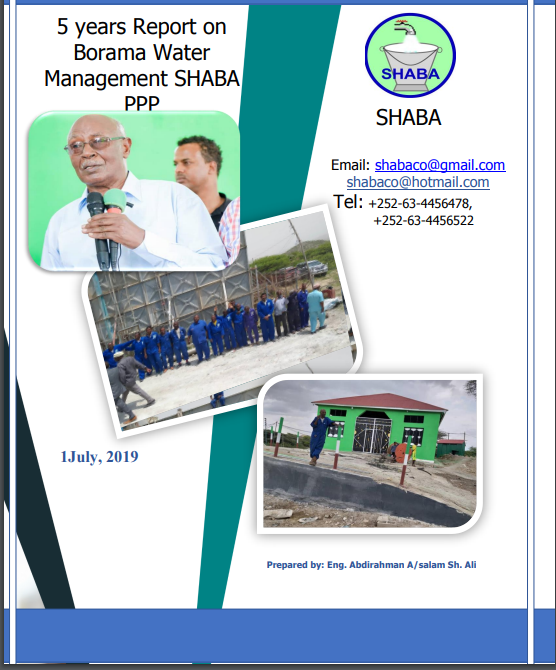prepared by Eng. Abdirahman Abdisalam Sh. Ali. Shaba’s manager
Introduction: The Borama Water Management SHABA PPP represents a pioneering Public-Private Partnership (PPP) in Somaliland, initiated in November 2003 with a 10-year lease agreement later renewed in 2013. This model has transformed water management in Borama, addressing chronic water shortages and inefficiencies under previous public management systems. The collaboration involves the Ministry of Water Development (MOWD), Borama Municipality, and SHABA, a private operator. This report summarizes the achievements, challenges, and recommendations from 2013 to 2019.
Historical Background: Borama’s first water supply system dates back to the 1930s, built by the British for government officials. Subsequent expansions occurred during the 1950s and 1980s with donor support but were frequently abandoned due to security issues and poor management. By 2000, Borama faced severe water crises, prompting a citizens’ workshop that recommended transitioning to a PPP model. In 2003, SHABA took over the water supply under a lease agreement, becoming the first PPP of its kind in Somaliland. Despite initial challenges, SHABA’s management has significantly improved water supply reliability and infrastructure.
Achievements: Since taking over in 2003, SHABA has achieved remarkable improvements. Water production increased from 500 cubic meters per day to 4,500 cubic meters per day by 2019. Household connections grew from 130 to over 14,500, ensuring 24/7 water availability. The infrastructure was upgraded with new boreholes, pipelines, reservoirs, and modern equipment. Efficiency gains included reducing water losses from 60% to 10%, implementing a transparent financial system, and ensuring affordable pricing. Additionally, SHABA generated revenue for Borama Municipality, contributing 3% of its sales.
Challenges: Several challenges have hindered progress. Rapid population growth has led to a demand-supply gap, compounded by limited public investment in primary and secondary water assets. High operational costs, including energy production, and the scattered nature of boreholes have further strained resources. Frequent changes in leadership within the Ministry of Water and a lack of understanding of PPP concepts among stakeholders created communication gaps. Climate change has also impacted water resources, exacerbating supply issues.
Recommendations: To address these challenges, several measures are recommended. Implementing the Borama Water Master Plan is crucial for meeting short- and long-term water needs. Developing centralized electricity systems and adopting renewable energy, such as solar-powered equipment, can reduce operational costs. Constructing rainwater harvesting mega schemes and enhancing soil and water conservation near aquifers are essential for sustainable resource management. Stakeholders must prioritize raising awareness and understanding of PPP models through workshops and study tours. Increased investments in primary assets by donors and public entities are critical for bridging the demand-supply gap.
Company Overview: SHABA operates under a structured governance system, including a general assembly of 21 shareholders, a board of directors, and a management team. It emphasizes transparency, sustainability, and community service. The company’s mission is to ensure reliable, safe, and affordable water supply for Borama residents while maintaining environmental sustainability. Its vision is to become a leading water management entity in Somaliland, recognized for integrity and quality service delivery.
Investments and Contributions: SHABA, along with donor organizations, has invested heavily in infrastructure and capacity building. Key achievements include drilling new boreholes, expanding pipeline networks, constructing reservoirs, and modernizing equipment. Notable projects include a 25-year master plan supported by UNICEF and contributions to research and hydrological studies. SHABA’s investments have exceeded $1 million, encompassing land acquisition, facility construction, and procurement of essential tools and machinery.
Future Plans: Emergency actions include replacing damaged infrastructure, such as the steel tank, and extending water services to marginalized communities. Short-term plans focus on integrating renewable energy, upgrading billing systems, and drilling additional boreholes. Long-term goals involve constructing a mega dam, implementing integrated water resource management strategies, and securing funding for the master plan. These initiatives aim to ensure sustainable water supply for Borama’s growing population.
Conclusion: The SHABA PPP model has demonstrated significant success in transforming Borama’s water management system, providing a reliable and efficient supply to the community. Despite facing challenges, the achievements highlight the potential of PPPs in addressing critical infrastructure issues. Continued collaboration, investment, and strategic planning are essential to sustaining and expanding these gains in the coming years.


No responses yet